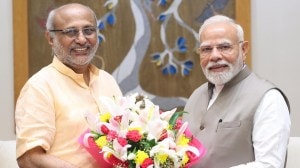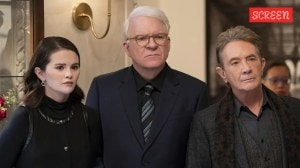India Inc tunes FM but Sensex hears static
His mission: Confidence Building, his timeline: 24 hours. And at the end of Finance Minister P Chidambaram’s gruelling stopover, Dalal ...

His mission: Confidence Building, his timeline: 24 hours. And at the end of Finance Minister P Chidambaram’s gruelling stopover, Dalal Street turned out too demanding—some said ‘‘immaturely so’’—falling over 100 points although the Harvard healer promised he had just the medicine that the economy needed.
After meeting Mumbai’s financial A-list, he made a brief announcement that the Union budget was just a month away, that he was the Minister for Investment and that the power sector would see a surge in investment in the coming months.
Chidambaram had traded his crisp white veshti for the more corporate trouser, blue shirt and formal black shoes on Thursday. And although those shoes hardly put a foot wrong — he obviously could not have laid bare his budget — the stock markets didn’t buy the package.
Soon after his afternoon media address, the Bombay Stock Exchange’s benchmark index crashed 105.7 points to end at 4817.99. The Sensex fell a dramatic 195 points from its day’s high of 5012.52.
Perhaps the markets had been over-optimistic. ‘‘There were expectations, but nothing concrete was announced,’’ said Rajen Shah, chief investment officer, Angel Broking. Of course, the slump could not entirely be attributed to the Chidambaram Effect.
Shah said that skyrocketing global oil prices and the reduction of foreign direct investment in airports from 74 per cent to 49 had had a sobering effect.
Chidambaram told industrialists that there wouldn’t be any disinvestment in navratnas, which include the major oil companies. ‘‘There is a clear message that it is a goodbye to strategic sale,’’ said Mukesh Ambani, chairman of Reliance Industries.
The 58-year-old lawyer tackled round after round of meetings—with bankers, brokers, financial institutions and top industrialists — single-handedly. ‘‘Practically everyone I met today has realised that the Common Minimum Programme will take the reforms process forward,’’ he told reporters at 2 pm after being in meetings for nearly four hours.
|
‘Six new power projects,
10 more lined up’ |
|||||
|
In a brief statement to the press after his series of meetings, Chidmbaram said: |
|||||
Earlier in the day, Chidambaram also met heads of foreign banks like Standard Chartered and Citigroup, and chiefs of domestic financial institutions like Life Insurance Corporation, General Insurance Corporation and Unit Trust of India.
Industrialists who met him on Thursday said they believed he was committed. ‘‘He is not dismissing the markets,’’ said Anand Mahindra, president, CII, after emerging from a lunch session with the FM. ‘‘He is open and willing to listen to our suggestions.’’ Then he met 15 or so top industrialists at the Taj Mahal Hotel’s plush Crystal Room for lunch.
Sitting at the head of a U-shaped table, the finance minister discussed his government’s stance with India’s corporate leaders. ‘‘He was very positive and confident,’’ said RPG group Vice-Chairman Harsh Goenka, who has known Chidambaram for several years.
A sharp, keen man, Chidamabaram was as usual very precise with his words. Goenka said the session began with a short statement by the minister on his government’s policies and was followed by informal discussions among the participants. ‘‘If he can say something in three words, he will not use a fourth,’’ noted an impressed Anant Panicher, who got a chance to interact with the FM while co-ordinating the meeting on behalf of the Videocon Group.
‘‘Sir, your last Budget was called the Dream Budget, you next Budget is just a month away, should we start dreaming?’’ asked a broker at the end of the 90-minute closed door meeting with the Finance Minsiter P Chidambram on Wednesday evening.
In response, Chidambram just smiled as he got up to shake hands with each one of 22 brokers, NSE officials, regulators and others.
(With inputs from Arundhati Bakshi-Dighe)
Photos



- 01
- 02
- 03
- 04
- 05



























